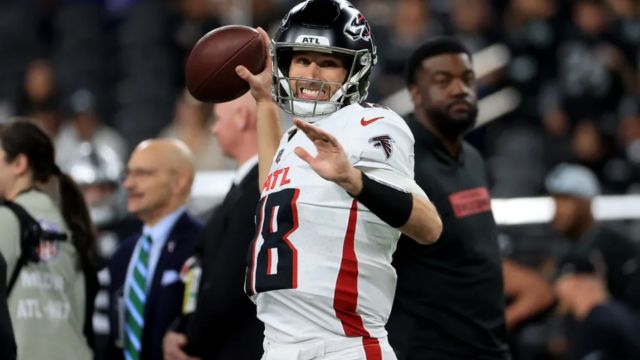The headline of the Atlanta Falcons’ most recent statement had shifted toward likely.
The undertone on Tuesday night was more unexpected.
The Falcons did not simply sit veteran quarterback Kirk Cousins 14 games after he inked a contract worth $90 million guaranteed at signing.
They also gave the rookie they drafted eighth overall the keys to the castle—indefinitely.
The Falcons may be focused on the Giants’ game, but the rest of the league is just as interested in Cousins’ next move.
Conversations with five league insiders from the coaching, management, and representation backgrounds provided perspective for Yahoo Sports in the hours following the Falcons’ announcement. The individuals spoke on the condition of anonymity because discussing the Falcons’ roster decisions would provide a competitive edge.
Here’s a snapshot of the league’s reaction to some of the key questions surrounding the move.
Will the Falcons face Cousins again?
Except for Penix’s injuries, everyone in the league said no. Sources did not believe the Falcons would switch quarterbacks or even give Penix a trial before designating him starter. Cousins’ previous five-game span, which included nine interceptions and only one touchdown, served to solidify that decision. However, the patchwork of causes includes a play-caller and quarterback struggling to find success together, an Achilles repair hangover that tends to persist the first season after the injury, and a desire to look ahead with a healthy runway for Penix rather than focusing on sunk costs. One source also expressed concern that Cousins would not agree to a decision to fight for his job in December if the team created a week-to-week proposition.
League sources overwhelmingly agreed with the Falcons’ choice to replace quarterbacks immediately, since Atlanta is 7-7 and one game behind the Tampa Bay Buccaneers in the NFC South competition. They argue on whether signing Cousins was a worthwhile risk for the Falcons.
Were the Falcons correct to sign Cousins and pick Penix in the same offseason?
It’s easy to argue that moving on from a quarterback after 14 games is a failure. And in terms of results, the Falcons’ move is effective. From a process perspective? Most clubs would rather take numerous chances at finding a viable quarterback if they can afford it, and one source even mentioned the benefits Penix and the Falcons may receive from sitting him for 14 games without the degree of pressure that other draft picks faced.
Number one pick Caleb Williams has taken a league-leading 58 sacks with the Chicago Bears, according to Penix. New England Patriots rookie quarterback and No. 3 choice Drake Maye began suffering hits later, as the team waited until Week 6 to start him, but he has since been under pressure on 14 dropbacks per game, which is comparable to the 15.2 that fuelled Williams’ league-high 213 pressures, according to Next Gen Stats.
Waiting to start Penix is a popular move throughout the league. Having Penix in-house was more complicated, but also valued. Signing Cousins to a lucrative contract beforehand? According to one NFC executive, the Falcons set themselves up to face criticism for bad process as soon as they signed both players. If either quarterback, let alone both, did not perform well, their decision to invest heavily in both seemed questionable.
“They pinned themselves into a corner,” the executive texted. “The only way for them to look good was for Kirk to play well/get hurt, and the kid to come in and perform well.
“If they trade Kirk, they will still pay him $62.5 million for a year. They were compelled to make this decision after taking the kid early in the draft. If they trade or cut Kirk and he goes elsewhere and does well, they will look horrible again. This is not a good situation to be in.
What are the financial ramifications for Atlanta?
Cousins is owed $27.5 million by the Falcons, which is guaranteed in 2025. If he remains on their roster on the fifth day of the 2025 league year (March 16, 2025), they will owe him an additional $10 million in early 2026 roster bonus, according to a person familiar with the contract. Cousins also has a full no-trade provision, giving him plenty of leeway in selecting his 2025 team. If Cousins follows in the footsteps of Russell Wilson, this may be detrimental to the Falcons.
After being released by the Denver Broncos in March, Wilson signed with (and now starts for) the Pittsburgh Steelers. He did not assist the Broncos with the offset clause, which forced them to pay for any portion of his contract that was not covered by another team. The Steelers will pay Wilson the veteran minimum of $1.21 million this season. The Broncos will pay him another $37.7 million in 2024. Expect the Falcons to pay $26.3 million of the $27.5 million next year if Cousins plays elsewhere.
In principle, even if a team signs Cousins to a multiyear contract, they might structure it ingeniously so that they effectively “borrow” $23.3 million from the Falcons in 2025 throughout the contract. Even with Penix’s rookie contract, the Falcons will be stretched thin. According to one league source, Cousins will have more negotiating power for a multiyear contract than Wilson did.
Where will Cousins play in 2025?
Sources in the executive and agent sectors concurred that betting confidently on any outcome is currently unrealistic. There is still movement at head coach, general manager, and quarterback for at least a half-dozen teams. The draft cycle is still in its early stages. Teams will need to consider their alternatives. Cousins will have an advantage, given the relatively limited quantity of starting quarterbacks slated to enter the market in 2025 via free agency and the draft.
“Sam Darnold and Russell Wilson are the two starters [heading to free agency] and after that, it’s a bunch of guys who have failed,” a source told me. “The draft is dreadful. The top two players are not first-round picks who will be selected just because there is a need, but they have a lot of flaws in their game.”
Teams will be more interested in a veteran with Cousins’ ability and proven resume than the prospect of drafting Miami’s Cam Ward or Colorado’s Shedeur Sanders. This is not a draft that included Caleb Williams, Jayden Daniels, Drake Maye, and others. It’s feasible that a team might want Cousins to serve as a bridge quarterback — Daniel Jones is expected to do the same following his release by the Giants — to buy time for good-but-not-great 2025 prospects.

Joann Hinds has been covering U.S. local news for three years, bringing stories that matter to life with accuracy and heart. Known for his keen eye for detail and a passion for community-focused reporting, Joann is dedicated to highlighting the people and events shaping everyday lives. His work reflects a deep commitment to honest and impactful journalism.

